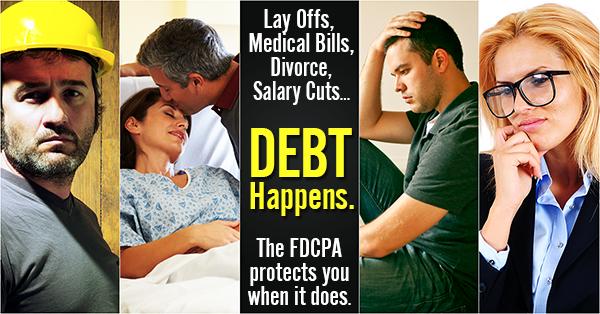Debt Collector Help
If you have been a victim of creditor or collector harassment you already know that unscrupulous bill collectors make life miserable. They can pound you with calls and letters, threaten to take your money, house, car or and other things, and commit other actions that violate federal consumer protection laws like the Fair Debt Collection Practices Act, 15 U.S. Code §1692 (the “FDCPA”) and other creditor harassment laws.
Whether you legitimately owe a debt or not, the FDCPA and other state fair debt statutes and federal consumer protection laws can help you. If you have been the victim of illegal creditor harassment, our debt lawyers can not only help you stop the harassment, but can turn the tables on creditors, and pursue compensation for you. Importantly, the law also provides a cash award to any consumer whose rights have been violated, even if the violation is technical only and the consumer suffers no actual harm!

Don’t face unscrupulous debt collectors alone. We have the knowledge, experience, and legal skills to deal with creditors on your behalf, protect your legal rights, and defend you against creditor and debt collector harassment. And even creditors and debt collectors is attempting to collect your debt in an ethical manner, they often still commit technical violations of your rights, which can gain you leverage over a late account.

A Debt Collector Cannot:
- Call you an unreasonable number of times
- Call at unusual times or places
- Use profane or other abusive language
- Share private information about your debts with others
- State you are a criminal or will be arrested
- Lie to or deceive you
- And, much, much more
But fair debt collection reaches much deeper than just this one law, and your fair debt rights include protections under the Fair Credit Reporting Act, Telephone Consumer Protection Act and other federal lending and banking consumer protection laws, as well as your State’s debt collection laws. And even if the collector didn’t do something illegal, someone else in the account chain may have your rights, and that violation could help you to turn the debt collection tables.

So anytime you are being collected on, it’s worth seeking a Fair Debt consult. With our help, you may be able to cease collection efforts, hold off collections until your debts are validated, and/or settle your debts for fractions of the amount demanded or owed. Where your fair debt rights have been violated, our law firm may even be able to sue a debt collector on your behalf. Not only may you be entitled to a monetary award, but the debt collector or other violator must also pay your attorney fees, meaning Thompson Consumer Law Group can usually enforce your FDCPA rights at no cost to you.
Contact us today and learn how we use things like collection letters, collection voice mails, collection call logs, and detailed notes of conversations with collectors, as well as credit report entries showing collector pulls and reporting, as powerful evidence in our fight against your debt collector problems. Being in debt can be scary…but it doesn’t have to be, and knowing your rights and being supported by Debt Help Lawyers, are two big steps in the right direction.
Still, people often wonder what other options for dealing with debt there are when none of their rights under any of these laws are violated. Some other options include debt settlement, filing bankruptcy, credit counseling or debt consolidation, loan modification or short sale, and of course, the worst option of all, doing nothing. Each option has its own terms, pros and cons.
Debt settlement

Debt settlement one of your options for dealing with debt. A debt settlement lawyer can help you manage late payments and overdue accounts, the actions of collection agencies and legal threats, as well as offer help negotiating the lowest settlement amount possible. Attorney’s negotiating your account often results in much lower settlement offers for loans and open accounts such as credit card bills.
Moreover, attorney involvement allows you to capitalize on violations of consumer protection law, which can actually net you settlement dollars or offset your debt. And even if you don’t qualify for debt settlement, you can still qualify for no cost Fair Debt and Fair Credit services. If your income cannot keep up with your debts and you want to get your finances under control, contact us for a free case review. Our debt settlement lawyers can negotiate on your behalf to reduce the amount of your debt, help you get your bills under control, and make it possible to avoid legal collection actions.
Filing bankruptcy under chapter 7 or 13
Consumers owing a large amount of credit card debt may see bankruptcy as their only debt relief alternative. And there are times bankruptcy is the easiest solution to eliminating outstanding debt. But, it carries with it the severe ramifications: it can appear on your credit report for up to 10 years, and is a matter of public record for anyone that wants to know.
Unless you get a complete discharge under chapter 7, bankruptcy requires a court-appointed trustee to control and oversee your estate, dictating how you pay back your creditors. Thus, though bankruptcy rightfully remains the final tool of financial wellness, it is truly an option best exercised with caution, and as a last resort for debt relief.

Consumers are eligible to file for bankruptcy help under chapters 7 (liquidation) and 13 (wage earners) of the United States Bankruptcy Code. Bankruptcy will eliminate all of your unsecured debt, including all credit cards, medical bills, personal loans and payday loans, most debts from civil lawsuits and even some taxes. And you’ll likely be able to keep your home and car.
Chapter 7 Bankruptcy is the bankruptcy chapter most commonly filed, and is for those deemed incapable of repaying their debts. Otherwise known as a liquidation, Chapter 7 debtors will undergo a careful review of assets to determine if any can be sold to repay creditors. Understanding that many hold their belongings close, our lawyers will work to shield our client’s valued assets under the exemptions to which they are entitled through bankruptcy law.
In a Chapter 13 bankruptcy, a repayment plan is set up under the protection of the bankruptcy code for those with enough disposable income to repay some of their debt. With an experienced hand, our bankruptcy attorney will draft an affordable repayment plan and provide representation to get the plan confirmed by the court. Chapter 13 debtors will continually receive personal attention throughout the term of the repayment plan and until their debt is discharged by the bankruptcy court.
Regardless of the chapter filed, all debtors are required to meet the trustee of their bankruptcy estate at a Meeting of Creditors. A bankruptcy attorney can prepare debtors for questions that a bankruptcy trustee will ask, and will even stand by their side at the meeting. While creditors are not required to attend this meeting, they are likely to in a
In the event you are considering bankruptcy, our capable bankruptcy attorneys are ready to help.
Consumer Credit Counseling
“Credit counseling” companies are generally set up and funded by the credit card companies. These companies do not settle debt, but rather make payments to your existing creditors through funds which you furnish them. In order to complete these programs, your creditors need to be paid in full — no accounts are settled and no savings are realized. Given credit counseling companies are compensated by the creditors, you have to wonder whose interests they have at heart. Still, credit counseling companies can lower the interest being charged and can save you some interest money on your high interest credit cards. You make one monthly payment to the consumer credit counseling agency, then they disburse your funds and pay each of your creditors for you. It is important to understand, though, that you will pay the full balance owed on your various accounts with interest. In other words, your creditors will not be forgiving any of the remaining balance that you still owe. Further, when working with one of these companies, any debt that they help you with will show as TPA (third party assistance) on your credit report.
Debt Consolidation Loan

Debt consolidation does not eliminate debt, but instead is simply a way of borrowing additional funds (usually secured by your home) to pay off your existing creditors. Its aim is not to save you money, but to get you a lower interest rate and the convenience of simply making one payment instead of many. Unfortunately, consolidation usually takes a much longer period of time to satisfy your debts, and most people should not acquire more debt to try and get out of debt. A consolidation program can also severely affect the ability to discharge debts in bankruptcy. And though a consolidation loan might have a lower interest rate than the rates you are currently being charged by your current creditors, very often debt consolidation loans are secured with property and you ultimately could find yourself facing the possibility of losing your home. Consolidation is in no manner similar to debt settlement!
Loan modification

A loan mod allows the debtor to renegotiate the terms of a loan with the intent of reducing his or her monthly payments. A loan modification is a change to the loan terms that is agreed to by and between the lender and the homeowner. The lender will modify the existing loan in order to work with the homeowner because of a hardship. The purpose is to help make the loan more affordable. Usually loan modifications are in the form of a rate reduction and/or fixing the rate for a certain period of time and/or even lowering your principal balance in extreme cases.
Loan modifications are for borrowers that are delinquent or struggling to make their mortgage payments and suffered a hardship such as a job loss, divorce, or illness. Borrowers can even obtain modifications from their lender to convert to a fixed rate loan from an adjustable rate mortgage.
The earlier the homeowner addresses the issue, the better the chances are of negotiating a lower fixed rate and a payment that is manageable. If the household can afford the home, but not their current mortgage, then they may be eligible for a loan modification. A key factor that is required in every loan modification submission is the existence of some type of a hardship. The hardship can be temporary in nature or permanent, but the borrower must be able to prove the hardship.
Short Sale
A short sale occurs when the proceeds of a debtor’s real estate sale fall short of the balance owed on the property’s mortgage. Usually this happens when the debtor can no longer pay the mortgage loan on the property and the creditor decides to sell the property at a moderate loss, rather than pressing the debtor and risking bankruptcy or foreclosure. An advantage to the short sale process is that it is typically faster than a foreclosure and avoids the steep bank loans. The debtor usually remains obligated to pay the deficiency, or the remaining balance of the loan, unless settlement is clearly stated on the acceptance of offer.
Because short sales are a form of debt settlement, they have a negative impact on a debtor’s credit report. Like all other entries except bankruptcy, short sales can remain on a credit report for the duration of seven years. It is possible to obtain another mortgage within one to three years after a short sale, depending on the debtor’s other credit information.
Do Nothing and Ignore Debts

Do nothing, is exactly as it sounds. For most people this is not a practical solution, but technically it is an option. Unfortunately even if you are doing nothing, your creditors will definitely not do the same. This course of action may result in lawsuits, repossession, and a lot of stress. Ignoring your debts will never make them disappear, but it will most likely cause you more grief in the short and long run.
An example where doing nothing might work for you would be if you were unemployed and had no assets a creditor could pursue. Essentially you would be “judgment proof” and your creditors would (at least temporarily) hit a roadblock. However, this does not mean that they can’t come after you at a later date…when you least expect it.








